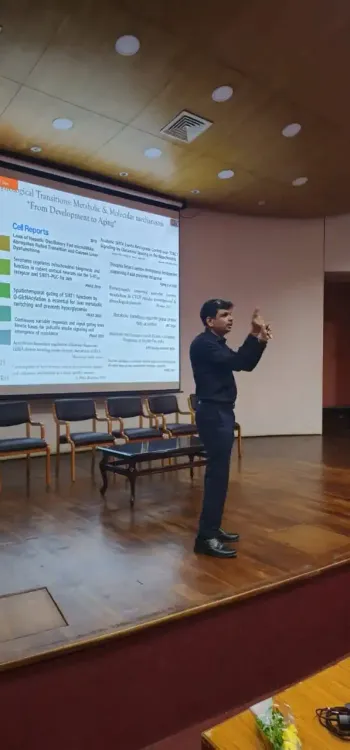Should Blood Test Reference Values Be Adjusted for Indian Conditions?

Synopsis
Key Takeaways
- Re-evaluating blood test reference values is essential for accurate diagnostics.
- Genetic, dietary, and environmental factors influence health outcomes.
- Interdisciplinary research is vital for addressing India's health challenges.
- Empowering Indian youth through improved healthcare will lead to global leadership.
- Collaboration between institutions can foster groundbreaking discoveries.
Thiruvananthapuram, May 12 (NationPress) A prominent scientist specializing in metabolism and aging has highlighted the necessity of re-evaluating the standard reference ranges for blood parameters to better suit Indian contexts, rather than adhering to the values established for the Western population.
"Blood parameters are critical for diagnosing metabolic disorders such as diabetes and cardiovascular diseases. Recent studies indicate that many standard reference ranges require adjustment for the Indian demographic," stated Ullas Kolthur-Seetharam, Director of the Centre for DNA Fingerprinting and Diagnostics (BRIC-CDFD) in Hyderabad, during a lecture at the National Technology Day event.
He pointed out that the reference values currently used in Indian laboratories are primarily based on Western populations. "Genetic, dietary, and environmental factors can significantly influence biomarkers, alongside individual life trajectories. Cutting-edge research is revealing how both acute and chronic changes in diet impact health fundamentally, affecting mitochondrial function and epigenetic regulation," added Seetharam.
Currently on deputation from the Tata Institute of Fundamental Research in Mumbai to CDFD, Seetharam has made groundbreaking contributions to understanding the intersection of mitochondrial function, epigenetics, and nutrition in determining health span.
He also established The Advanced Research Unit on Metabolism, Development and Aging (ARUMDA) at TIFR, a pioneering initiative that addresses India's Double and Triple Burdens of Malnutrition, Non-communicable Diseases, and Aging through interdisciplinary research.
Chandrabhas Narayana, Director of BRIC-RGCB, who presided over the function, noted the significance of this year's National Technology Day theme: "Empowering Indian Youth for Global Leadership in Science and Innovation for Viksit Bharat." He emphasized the current focus on research, entrepreneurship, and skill development.
Narayana reiterated that RGCB is dedicated to fostering an ecosystem that supports young researchers and entrepreneurs in making groundbreaking discoveries and advancing the latest technologies.










